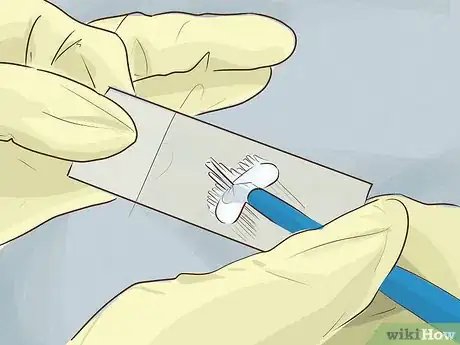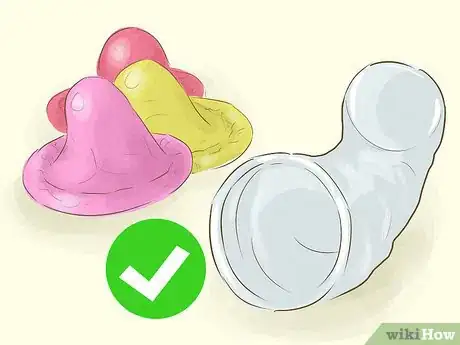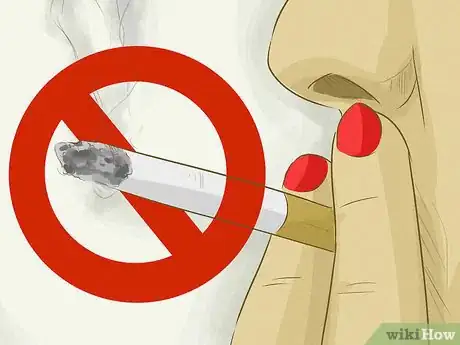This article was co-authored by Jennifer Butt, MD. Jennifer Butt, MD, is a board certified Obstetrician and Gynecologist operating her private practice, Upper East Side OB/GYN, in New York City, New York. She is affiliated with Lenox Hill Hospital. She earned a BA in Biological Studies from Rutgers University and an MD from Rutgers – Robert Wood Johnson Medical School. She then completed her residency in obstetrics and gynecology at Robert Wood Johnson University Hospital. Dr. Butt is board certified by the American Board of Obstetrics and Gynecology. She is a Fellow of the American College of Obstetricians and Gynecologists and a member of the American Medical Association.
There are 9 references cited in this article, which can be found at the bottom of the page.
wikiHow marks an article as reader-approved once it receives enough positive feedback. In this case, 100% of readers who voted found the article helpful, earning it our reader-approved status.
This article has been viewed 39,282 times.
Keeping your cervix healthy is an important component of good reproductive health. Cervical health issues include inflammation, growths, and cancer, but fortunately many of these conditions can be prevented and/or treated. By taking steps to reduce your personal risk factors, and working to maintain a strong immune system, you can keep your cervix healthy.
Steps
Reducing Risk Factors
-
1Have regular pap smears.[1] It is always a good idea to visit your gynecologist for a check up each year. At these visits, you can have your doctor perform a pap smear: a painless procedure that tests for abnormal cells on the cervix. This test is the best way to catch early signs of cervical cancer, allowing you to treat any problems effectively.[2]
- Women ages 21-29 should get a Pap test every 3 years.
- Women ages 30-64 should get a Pap test, as well as a human papillomavirus (HPV) test every 5 years, or just a Pap test every 3 years.
- Women 65 or older may be able to stop having Pap tests. Talk to your doctor to find out.
-
2Get tested for STIs. Unless you specifically ask for it to be done, your annual gynecological visit may not include STI testing. If you are sexually active, ask to be tested. If you should test positive for anything, speak to you doctor about treatment options.[3]
- Cervical cancer can result from certain strains of HPV (human papilloma virus), which nearly 79 million Americans have.[4]
- If you test positive for HPV, don’t fret. Not all HPV will result in cancer, and many people never have symptoms of HPV.
- Untreated chlamydia and gonorrhea can also cause inflammation in your cervix.
Advertisement -
3Use condoms. Using condoms during intercourse is the most effective way to effectively prevent the transmission of STIs. Using condoms is therefore one of the best ways to prevent infection and keep your cervix healthy.[5]
- Try both female and male condoms to see what you prefer.
- Sex toys, hands, or anything else that gets inserted in your vagina should be covered by a condom.
- Limiting your number of sexual partners and making sure partners have been tested also reduces your risk of contracting STIs.
-
4Quit smoking. Smoking cigarettes has been definitively linked to cervical cancer. Nicotine and other carcinogens can accumulate in the cervical mucus of women who smoke. If you smoke, consider quitting, especially if you have HPV. It is an important step toward preventing cervical cancer.[6]
-
5Consider other possible risk factors. Learning about other potential risk factors can help you (and your doctor) decide if you may be at a higher risk for contracting cervical cancer. Some of these risk factors include: being overweight, the long-term use of birth control pills, IUD use, a first pregnancy before the age 17, and a family history of cervical cancer. If one or more of these risk factors apply to you, talk to your doctor about what preventative measures you can take.[7]
- Women who have no children and are not sexually active may also be more likely to get cervical cancer.
-
6Get the HPV vaccine. The HPV vaccine has been proven effective at preventing strains of HPV that cause cervical cancer. Get the vaccine before you become sexually active to prevent the contraction of HPV. Although this vaccine is expensive, consider getting it if you can. Discuss this option with your doctor, and talk to your insurance company about coverage.[8]
- It is recommended for girls and boys aged 9 to 26 to receive this vaccine.
- The average cost of each shot ranges from $130 to $150. This adds up to a total of $390 to $450 for the series.
-
7Treat cervical health problems as early as possible. Cervical inflammation, growths, and cancer are all treatable conditions, and treatment is the most effective the earlier such conditions are diagnosed.[9] Treatment will depend on the exact nature of the condition, and how far it has advanced. Some common treatment options for cervical health conditions include:
- Medication
- Surgery
- Radiation therapy
- Chemotherapy (chemo)
- Targeted therapy
Maintaining a Healthy Immune System
-
1
-
2Eat foods that are good for your cervix. Maintaining a healthy diet--filled with fruits, vegetables, protein, whole grains, and healthy fats--can also help you maintain a strong immune system. Additionally, eating certain vitamins and minerals can improve the health of your cervix.[11] Some of these important nutrients include:
- Beta-carotene (found in yellow-orange vegetables/fruits like carrots, peaches, and squash)
- Folic acid (found in dark green leafy vegetables)
- Vitamin C (found in citrus fruit)
- Vitamin E (found in whole-grains)
- Lycopene (found in tomatoes, watermelon, and grapefruit)
-
3Cope with stress. High levels of stress can put a strain on your immune system. If you are under a lot of stress, take some steps to cope with it. You might try:
- Talking with friends or family
- Talking with someone in a community service organization.
- Talking with your physician or therapist
- Doing yoga
- Practicing deep breathing
-
4Take extra precautions when your immune system may be weakened. When your immune system is weakened, you may be at a higher risk for cervical issues. Be sure to use condoms for intercourse and have regular check-ups with your gynecologist. Your immune system may be impaired if you have:[12]
- Been diagnosed with HIV/AIDS
- Been diagnosed with chronic fatigue syndrome
- Used steroids/corticosteroids recently
- Had an organ transplant or kidney dialysis
- Had chemotherapy
References
- ↑ Jennifer Butt, MD. Board Certified Obstetrician & Gynecologist. Expert Interview. 13 March 2020.
- ↑ https://www.womenshealth.gov/a-z-topics/pap-hpv-tests
- ↑ https://www.cdc.gov/std/prevention/screeningreccs.htm
- ↑ https://www.cdc.gov/std/hpv/stdfact-hpv.htm
- ↑ https://www.acog.org/womens-health/faqs/how-to-prevent-stis
- ↑ https://www.cancer.org/cancer/cervical-cancer/causes-risks-prevention/risk-factors.html
- ↑ https://www.cancer.org/cancer/cervical-cancer/causes-risks-prevention/risk-factors.html
- ↑ https://www.cdc.gov/vaccines/vpd/hpv/public/index.html
- ↑ Jennifer Butt, MD. Board Certified Obstetrician & Gynecologist. Expert Interview. 13 March 2020.



































































Medical Disclaimer
The content of this article is not intended to be a substitute for professional medical advice, examination, diagnosis, or treatment. You should always contact your doctor or other qualified healthcare professional before starting, changing, or stopping any kind of health treatment.
Read More...